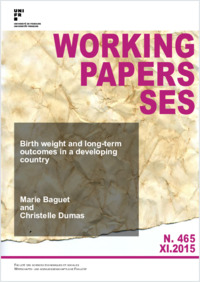Birth weight and long-term outcomes in a developing country
BP2-STS
-
30.10.2015
44
English
This paper analyzes the empirical relationship between endowment at birth and long-term outcomes. Birth weight has been shown to influence outcomes later in life, suggesting that in-utero shocks have long lasting consequences. However, traditional measures of human capital at birth (i.e. birth weight) are potentially measured with error and endogenous. We deal with such issues thanks to the use of a long panel of children born in 1983 in Cebu (Philippines) and interviewed repeatedly until 2005. Our contribution is threefold. First, we build a refined health endowment measure netted out from prenatal investments. Our results show that the usual estimate of birth weight exceeds by 50\% the true causal effect of birth weight on later outcomes. Second, initial endowments affect trajectories both through the human capital production function and parental investment. The effect of birth endowment fades out over time but remains until adulthood. The fading out is very limited for health outcomes but more pronounced for educational outcomes. Finally, we find that parents tend to reinforce initial health endowments, but the effect of this behavior has almost no effect on final outcomes.
- Collections
- Faculty
- Faculté des sciences économiques et sociales et du management
- Language
-
- English
- Classification
- Economics
- Series statement
-
- Working Papers SES ; 465
- License
- License undefined
- Identifiers
-
- RERO DOC 257628
- RERO R008306907
- Persistent URL
- https://folia.unifr.ch/unifr/documents/304501
Statistics
Document views: 144
File downloads:
- WP_SES_465.pdf: 216
